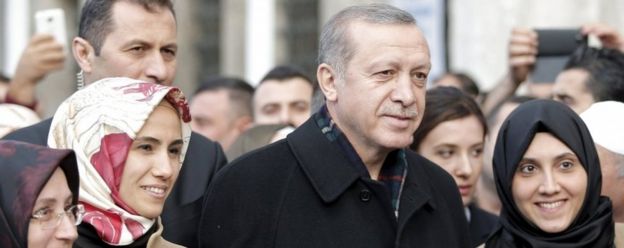Buoying Erdogan
"It's a massive shift of vote compared to the previous election. Erdogan's focus on security and stability seems to have attracted Turkish and Kurdish votes."
Fadi Hakura, Turkey analyst, Chatham House, London
"We will all have to show respect to the national will."
"Turkey has made great strides in democracy and this stride will be strengthened with today's election."
Turkish President Recep Tayyip Erdogan, Istanbul
 |
| President Erdogan spoke to reporters after praying at a mosque in Istanbul early on Monday - Reuters |
"I regret to say that there wasn't a fair or equal election. We were not able to lead an election campaign, we tried to protect our people against attacks."
Selahattin Demirtas, HDP co-chairman
The party, said Mr. Demirtas, had little option but to cancel election rallies. Moreover, Turkish television stations offered HDP party representatives scant airtime to fend off the government attacks categorizing the party as representing the political wing of the Kurdistan Workers' Party. Labelled and treated as a terrorist organization in Turkey. The HDP, on the other hand, serves the interests of Turkey's Kurds by favouring renewed peace efforts to end the Kurdish conflict.
While it seems evident enough that Mr. Erdogan and his AKP Justice and Development party saw the utility in casting the PKK as the aggressor, with the Turkish military simply responding to a terrorist group's threats to destabilize the country and in the process terrorize and murder loyal Turks, this device was extraordinarily useful to persuading voters how to cast their ballots. This all resulted from a massive gamble once the pro-Kurdish People's Democtratic Party had won ten seats in the May parliamentary election, reducing the AKP to a slenderized majority.
Calling another election, and in the interim grooming the population to once again recognize the AKP as the only assured protection the country could call upon to stand between terror and order, the die was cast for the AKP to successfully engineer a majority come-back. Which still leaves a jubilant Erdogan in a position to cast about for means by which he can, as president, assume the powers he once enjoyed as prime minister, now denied him constitutionally.
With the massive majority that the Justice and Development Party felt assured they would attain, it would have been possible to alter the constitution to give wide-sweeping powers to the presidency. In that sense, at least, he is back to square one. But he is still able to manipulate the position of the prime ministerial office through his colleague Prime Minister Ahmet Davutoglu, as a puppet-master, reminiscent of the charade played out between Russian President Vladimir Putin and Dmitry Medvedev.
Both strongmen, both vehement in their hatred for their perceived enemies; in Mr. Putin's case, the Chechens, in Mr. Erdogan's the Kurds, each is self-aggrandizing and bombastic, scorning democracy even while manipulating it to their advantage, and each enjoying wide support from their electorate. Both consider themselves to be their country's saviours, and as such preen and gloat and issue terse warnings to those who seek to threaten their rule.
Each has overseen massive corruption, giving massive monetary entitlements to their cronies, while denying opportunities for advancement to their political opponents. Each has anointed himself indispensable to their country's future, and each appropriated massive state funds to build palatial estates for themselves befitting the crowned rule of their nations. And there the similarities come up hard against inconvenient realities that separate their wheat from their chaff.
Turkey is a member of NATO, a supposed ally of the United States, although their avenues of approach to shared problems lead them to distinctly opposite actions and reactions. The U.S., in the matter of Syria's wholesale complex conflicts, engages with, supports, arms and trains the Iraqi and Syrian Kurds who present a formidable line of defence against Islamic State. Turkey gave haven and support to ISIL, and targets the Kurds and their militias, indispensable to the war effort against ISIL.
So now that President Erdogan's party is back in glowing and glowering power, firmly in control of the Turkish political arena, he must address the renewal of civil war in the Kurdish-occupied southeast of the country. The mind-numbing issue of millions of Syrian refugees continuing to flood over the border from Syria to join the already-positioned millions in squalid refugee camps in Turkey must also be addressed, and negotiations with the European Union which pleads with Turkey to keep the refugees confined to their shores may yet earn Turkey entre to the EU.
Europe views Turkey's issues with fairly clear eyes, only occasionally clouded over from the pressure of the refugee tide crossing from Turkey via the Aegean to Europe. Turkey's repression of journalists and free speech, its ongoing oppression of its Kurdish population, and its unreliability as an ally battling Islamic State jihadis, aligned with its poor human rights record makes it an unfit candidate for EU membership, leaving the EU to hope that financial offers to manage the refugees can persuade Erdogan to be cooperative.
On the issue of the election, European observers have criticised the government for stifling media freedom. And the Organisation for Security and Cooperation in Europe (OSCE) voiced their unwelcome opinion that violence, especially in the country's south-east, had had a significant impact on the election. As well, the Parliamentary Assembly of the Council of Europe (PACE) went on to denounce the entire process as "unfair".
To all of which Mr. Erdogan has responded tersely: "The national will manifested itself on 1 November in favour of stability. Now a party with some 50% [of the vote] in Turkey has attained power... This should be respected by the whole world, but I have not seen such maturity."
Labels: Conflict, Election, Erdogan, Islamic State, Kurds, Turkey

<< Home